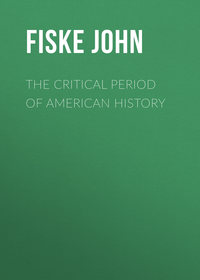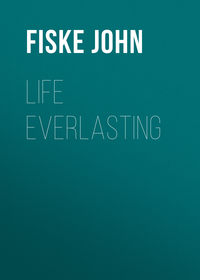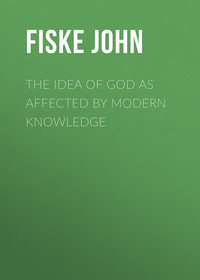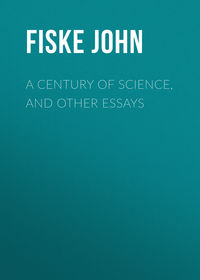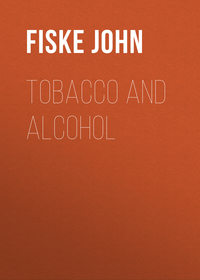 полная версия
полная версияThrough Nature to God
But we have not time at present for entering upon so vast a subject. Let this reference suffice to show that it has not been passed over or forgotten in my theory of the genesis of Humanity. In an account of the evolution of the religious sentiment, its first appearance as coeval, or nearly so, with the beginnings of the ethical process would assume great importance. We have here been concerned purely with the ethical process itself, which we have found to be – as Huxley truly says in his footnote – part and parcel of the general process of evolution. Our historical survey of the genesis of Humanity seems to show very forcibly that a society of Human Souls living in conformity to a perfect Moral Law is the end toward which, ever since the time when our solar system was a patch of nebulous vapour, the cosmic process has been aiming. After our cooling planet had become the seat of organic life, the process of natural selection went on for long ages seemingly, but not really at random; for our retrospect shows that its ultimate tendency was towards singling out one creature and exalting his intelligence.
Now we have seen that this increase of intelligence itself, by entailing upon Man the helplessness of infancy, led directly to the production of those social conditions that called the ethical process into play and set it actively to work. Thus we may see the absurdity of trying to separate the moral nature of Man from the rest of his nature, and to assign for it a separate and independent history. The essential solidarity in the cosmic process will admit of no such fanciful detachment of one part from another. All parts are involved one in another. Again, the ethical process is not only part and parcel of the cosmic process, but it is its crown and consummation. Toward the spiritual perfection of Humanity the stupendous momentum of the cosmic process has all along been tending. That spiritual perfection is the true goal of evolution, the divine end that was involved in the beginning. When Huxley asks us to believe that "the cosmic process has no sort of relation to moral ends," I feel like replying with the question, "Does not the cosmic process exist purely for the sake of moral ends?" Subtract from the universe its ethical meaning, and nothing remains but an unreal phantom, the figment of false metaphysics.
We have now arrived at a position from which a glimmer of light is thrown upon some of the dark problems connected with the moral government of the world. We can begin to see why misery and wrongdoing are permitted to exist, and why the creative energy advances by such slow and tortuous methods toward the fulfilment of its divine purpose. In order to understand these things, we must ask, What is the ultimate goal of the ethical process? According to the utilitarian philosophy that goal is the completion of human happiness. But this interpretation soon refutes itself. A world of completed happiness might well be a world of quiescence, of stagnation, of automatism, of blankness; the dynamics of evolution would have no place in it. But suppose we say that the ultimate goal of the ethical process is the perfecting of human character? This form of statement contains far more than the other. Consummation of happiness is a natural outcome of the perfecting of character, but that perfecting can be achieved only through struggle, through discipline, through resistance. It is for him that overcometh that the crown of life is reserved. The consummate product of a world of evolution is the character that creates happiness, that is replete with dynamic possibilities of fresh life and activity in directions forever new. Such a character is the reflected image of God, and in it are contained the promise and potency of life everlasting.
No such character could be produced by any act of special creation in a garden of Eden. It must be the consummate efflorescence of long ages of evolution, and a world of evolution is necessarily characterized by slow processes, many of which to a looker-on seem like tentative experiments, with an enormous sacrifice of ephemeral forms of life. Thus while the Earth Spirit goes on, unhasting, yet unresting, weaving in the loom of Time the visible garment of God, we begin to see that even what look like failures and blemishes have been from the outset involved in the accomplishment of the all-wise and all-holy purpose, the perfecting of the spiritual Man in the likeness of his Heavenly Father.
These points will receive further indirect illustration as we complete our outline sketch of the cosmic process in the past. It is self-evident that in the production of an ethical character, altruistic feelings and impulses must coöperate. Let us look, then, for some of the beginnings of altruism in the course of the evolution of life.
XI
Maternity and the Evolution of Altruism
From an early period of the life-history of our planet, the preservation of the species had obviously become quite as imperative an end as the preservation of individuals; one is at first inclined to say more imperative, but if we pause long enough to remember that total failure to preserve individuals would be equivalent to immediate extinction of the species, we see that the one requirement is as indispensable as the other. Individuals must be preserved, and the struggle for life is between them; species must be preserved, and in the rivalry those have the best chance in which the offspring are either most redundant in numbers or are best cared for. In plants and animals of all but the higher types, the offspring are spores or seeds, larvæ or spawn, or self-maturing eggs. In the absence of parental care the persistence of the species is ensured by the enormous number of such offspring. A single codfish, in a single season, will lay six million eggs, nearly all of which perish, of course, or else in a few years the ocean could not hold all the codfishes. But the princess in the Arabian tale, who fought with the malignant Jinni, could not for her life pick up all the scattered seeds of the pomegranate; and in like manner of the codfish eggs, one in a million or so escapes and the species is maintained. But in the highest types of animal life in birds and mammals – with their four-chambered hearts, completely arterialized blood, and enhanced consciousness – parental care becomes effective in protecting the offspring, and the excessive production diminishes. With birds, the necessity of maintaining a high temperature for the eggs leads to the building of nests, to a division of labour in the securing of food, to the development of a temporary maternal instinct, and to conjugal alliances which in some birds last for a lifetime. As the eggs become effectively guarded the number diminishes, till instead of millions there are half a dozen. When it comes to her more valuable products, Nature is not such a reckless squanderer after all. So with mammals, for the most part the young are in litters of half a dozen or so; but in Man, with his prolonged and costly infancy parental care reaches its highest development and concentration in rearing children one by one.
From the dawn of life, I need hardly say, all the instincts that have contributed to the preservation of offspring must have been favoured and cultivated by natural selection, and in many cases even in types of life very remote from Humanity, such instincts have prompted to very different actions from such as would flow from the mere instinct of self-preservation. If you thrust your walking-stick into an ant-heap, and watch the wild hurry and confusion that ensues when part of the interior is laid bare, you will see that all the workers are busy in moving the larvæ into places of safety. It is not exactly a maternal instinct, for the workers are not mothers, but it is an altruistic instinct involving acts of self-devotion. So in the case of fish that ascend rivers or bays at spawning time, the actions of the whole shoal are determined by a temporarily predominant instinct that tends towards an altruistic result. In these and lower grades of life there is already something at work besides the mere struggle for life between individuals; there is something more than mere contention and slaughter; there is the effort towards cherishing another life than one's own. In these regions of animate existence we catch glimpses of the cosmic roots of love and self-sacrifice. For the simplest and rudest productions of Nature mere egoism might suffice, but to the achievement of any higher aim some adumbration of altruism was indispensable.
Before such divine things as love and self-sacrifice could spring up from their cosmic roots and put forth their efflorescence, it was necessary that conscious personal relations should become established between mother and infant. We have already observed the critical importance of these relations in the earliest stages of the evolution of human society. We may now add that the relation between mother and child must have furnished the first occasion for the sustained and regular development of the altruistic feelings. The capacity for unselfish devotion called forth in that relation could afterward be utilized in the conduct of individuals not thus related to one another.
Of all kinds of altruism the mother's was no doubt the earliest; it was the derivative source from which all other kinds were by slow degrees developed. In the evolution of these altruistic feelings, therefore, – feelings which are an absolutely indispensable constituent in the process of ethical development, – the first appearance of real maternity was an epoch of most profound interest and importance in the history of life upon the earth.
Now maternity, in the true and full sense of the word, is something which was not realized until a comparatively recent stage of the earth's history. God's highest work is never perfected save in the fulness of time. For countless ages there were parents and offspring before the slow but never aimless or wanton cosmic process had brought into existence the conscious personal relationship between mother and child. Protection of eggs and larvæ scarcely suffices for the evolution of true maternity; the relation of moth to caterpillar is certainly very far from being a prototype of it. What spectacle could be more dreary than that of the Jurassic period, with its lords of creation, the oviparous dinosaurs, crawling or bounding over the land, splashing amid the mighty waters, whizzing bat-like through the air, horrible brutes innumerable, with bulky bodies and tiny brains, clumsy, coarse in fibre, and cold-blooded.
"Dragons of the prime,That tare each other in their slime."The remnants of that far-off dismal age have been left behind in great abundance, and from them we can easily reconstruct the loathsome picture of a world of dominating egoism, whose redemption through the evolution of true maternity had not yet effectively begun. For such a world might Caliban's theology indeed seem fitted. Nearly nine tenths of our planet's past life-history, measured in duration, had passed away without achieving any higher result than this, – a fact which for impatient reformers may have in it some crumbs of consolation.
For, though the mills of God grind slowly, the cosmic process was aiming at something better than egoism and dinosaurs, and at some time during the long period of the Chalk deposits there began the tremendous world-wide rivalry between these dragons and the rising class of warm-blooded viviparous mammals which had hitherto played an insignificant part in the world. The very name of this class of animals is taken from the function of motherhood. The offspring of these "mammas" come into the world as recognizable personalities, so far developed that the relation between mother and child begins as a relation of personal affection. The new-born mammal is not an egg nor a caterpillar, but a baby, and the baby's dawning consciousness opens up a narrow horizon of sympathy and tenderness, a horizon of which the expansion shall in due course of ages reveal a new heaven and a new earth. At first the nascent altruism was crude enough, but it must have sufficed to make mutual understanding and cooperation more possible than before; it thus contributed to the advancement of mammalian intelligence, and prepared the way for gregariousness, by and by to culminate in sociality, as already described. In the history of creation the mammals were moderns, equipped with more effective means of ensuring survival than their oviparous antagonists. The development of complete mammality was no sudden thing. Some of the dinosaurs may have been ovoviviparous, like some modern serpents. The Australian duck-bill, a relic of the most ancient incipient mammality, is still oviparous; the opossum and kangaroo preserve the record of a stage when viviparousness was but partially achieved; but with the advent of the placental mammals the break with the old order of things was complete.
The results of the struggle are registered in the Eocene rocks. The ancient world had found its Waterloo. Gone were the dragons who so long had lorded it over both hemispheres, – brontosaurs, iguanodons, plesiosaurs, lælaps, pterodactyls, – all gone; their uncouth brood quite vanished from the earth, and nothing left alive as a reminder, save a few degenerate collateral kin, such as snakes and crocodiles, objects of dread and loathing to higher creatures. Never in the history of our planet has there been a more sweeping victory than that of the mammals, nor has Nature had any further occasion for victories of that sort. The mammal remains the highest type of animal existence, and subsequent progress has been shown in the perfecting of that type where most perfectible.
XII
The Omnipresent Ethical Trend
With the evolution of true maternity Nature was ready to proceed to her highest grades of work. Intelligence was next to be lifted to higher levels, and the order of mammals with greatest prehensile capacities, the primates with their incipient hands, were the most favourable subjects in which to carry on this process. The later stages of the marvellous story we have already passed in review. We have seen the accumulating intelligence lengthen the period of infancy, and thus prolong the relations of loving sympathy between mother and child; we have seen the human family and human society thus brought into existence; and along therewith we have recognized the necessity laid upon each individual for conforming his conduct to a standard external to himself. At this point, without encountering any breach of continuity in the cosmic process, we crossed the threshold of the ethical world, and entered a region where civilization, or the gradual perfecting of the spiritual qualities, is henceforth Nature's paramount aim. To penetrate further into this region would be to follow the progress of civilization, while the primitive canoe develops into the Cunard steamship, the hieroglyphic battle-sketch into epics and dramas, sun-catcher myths into the Newtonian astronomy, wandering tribes into mighty nations, the ethics of the clan into the moral law for all men. The story shows us Man becoming more and more clearly the image of God, exercising creative attributes, transforming his physical environment, incarnating his thoughts in visible and tangible shapes all over the world, and extorting from the abysses of space the secrets of vanished ages. From lowly beginnings, without breach of continuity, and through the cumulative action of minute and inconspicuous causes, the resistless momentum of cosmic events has tended toward such kind of consummation; and part and parcel of the whole process, inseparably wrapped up with every other part, has been the evolution of the sentiments which tend to subordinate mere egoism to unselfish and moral ends.
A narrow or partial survey might fail to make clear the solidarity of the cosmic process. But the history of creation, when broadly and patiently considered, brings home to us with fresh emphasis the profound truth of what Emerson once said, that "the lesson of life … is to believe what the years and the centuries say against the hours; to resist the usurpation of particulars; to penetrate to their catholic sense." When we have learned this lesson, our misgivings vanish, and we breathe a clear atmosphere of faith. Though in many ways God's work is above our comprehension, yet those parts of the world's story that we can decipher well warrant the belief that while in Nature there may be divine irony, there can be no such thing as wanton mockery, for profoundly underlying the surface entanglement of her actions we may discern the omnipresent ethical trend. The moral sentiments, the moral law, devotion to unselfish ends, disinterested love, nobility of soul, – these are Nature's most highly wrought products, latest in coming to maturity; they are the consummation, toward which all earlier prophecy has pointed. We are right, then, in greeting the rejuvenescent summer with devout faith and hope. Below the surface din and clashing of the struggle for life we hear the undertone of the deep ethical purpose, as it rolls in solemn music through the ages, its volume swelled by every victory, great or small, of right over wrong, till in the fulness of time, in God's own time, it shall burst forth in the triumphant chorus of Humanity purified and redeemed.
THE EVERLASTING REALITY OF RELIGION
I
"Deo erexit Voltaire"
The visitor to Geneva whose studies have made him duly acquainted with the most interesting human personality of all that are associated with that historic city will never leave the place without making a pilgrimage to the chateau of Ferney. In that refined and quiet rural homestead things still remain very much as on the day when the aged Voltaire left it for the last visit to Paris, where his long life was worthily ended amid words and deeds of affectionate homage. One may sit down at the table where was written the most perfect prose, perhaps, that ever flowed from pen, and look about the little room with its evidences of plain living and high thinking, until one seems to recall the eccentric figure of the vanished Master, with his flashes of shrewd wisdom and caustic wit, his insatiable thirst for knowledge, his consuming hatred of bigotry and oppression, his merciless contempt for shams, his boundless enthusiasm of humanity. As we stroll in the park, that quaint presence goes along with us till all at once in a shady walk we come upon something highly significant and characteristic, the little parish church with its Latin inscription over the portal, Deo erexit Voltaire, i. e. "Voltaire built it for God," and as we muse upon it, the piercing eyes and sardonic but not unkindly smile seem still to follow us. What meant this eccentric inscription?
When Voltaire became possessor of the manor of Ferney, the church was badly out of repair, and stood where it obstructed the view from certain windows of the chateau. So he had it cleared away, and built in a better spot the new church that is still there. It was duly consecrated, and the Pope further hallowed it with some relics of ancient saints, and there for many a year the tenants and dependents of the manor assembled for divine service. Nowhere in France had Voltaire ever seen a church dedicated simply to God; it was always to Our Lady of This or Saint So-and-so of That; always there was some intermediary between the devout soul and the God of its worship. Not thus should it be with Voltaire's church, built upon his own estate to minister to the spiritual needs of his people. It should be dedicated simply and without further qualification to the worship and service of God. Furthermore, it was built and dedicated, not by any ecclesiastical or corporate body, but by the lord of that manor, the individual layman, Voltaire.
This, I say, was highly characteristic and significant. It gave terse and pointed expression to Voltaire's way of looking at such things. Church and theology were ignored, and the individual soul was left alone with its God. The Protestant reformers and other freethinkers had stopped far short of this. In place of an infallible Church they had left an infallible Book; if they rejected transubstantiation, they retained as obligatory such doctrines as those of the incarnation and atonement; if they laughed at the miracles of mediæval saints, they would allow no discredit to be thrown upon those of the apostolic age; in short, they left standing a large part, if not the larger part, of the supernatural edifice within which the religious mind of Europe had so long been sheltered. But Voltaire regarded that whole supernatural edifice as so much rubbish which was impeding the free development of the human mind, and ought as quickly as possible to be torn to pieces and cleared away. His emotions as well as his reason were concerned in this conclusion. Organized Christianity, as it then existed in France, was responsible for much atrocious injustice, and in neighbouring lands the Inquisition still existed. Ecclesiastical bigotry, the prejudice of ignorance, whatever tended to hold people in darkness and restrain them from the free and natural use of their faculties, Voltaire hated with all the intensity of which he was capable. He summed it all up in one abstract term and personified it as "The Infamous," and the watchword of that life of tireless vigilance was "Crush the Infamous!" Supernatural theology had been too often pressed into the service of "The Infamous," and for supernatural theology Voltaire could find no place in his scheme of things. He lost no chance of assailing it with mockery and sarcasm made terrible by the earnestness of his purpose, until he came in many quarters to be regarded as the most inveterate antagonist the Church had ever known.
Yet among the great men of letters in France contemporary with Voltaire, the most part went immeasurably farther than he, and went in a different direction withal, for they denied the reality of Religion. Few of them, indeed, believed in the existence of God, or would have had anything to do with building a house of worship. It is related of David Hume that when dining once in a party of eighteen at the house of Baron d'Holbach, he expressed a doubt as to whether any person could anywhere be found to avow himself dogmatically an atheist. "Indeed, my dear sir," quoth the host, "you are this moment sitting at table with seventeen such persons." Among that group of philosophers were men of great intelligence and lofty purpose, such as D'Alembert, Diderot, Helvétius, Condorcet, Buffon, men with more of the real spirit of Christianity in their natures than could be found in half the churches of Christendom. The roots of their atheism were emotional rather than philosophical. It was part of the generous but rash and superficial impatience with which they disowned all connection whatever with a Church that had become subservient to so much that was bad. Their atheism was one of the fruits of the vicious policy which had suppressed Huguenotism in France; it was an early instance of what has since been often observed, that materialism and atheism are much more apt to flourish in Romanist than in Protestant countries. The form of religion which is already to some extent purified and rationalized awakens no such violent revulsion in free-thinking minds as the form that is more heavily encumbered with remnants of obsolete primitive thought. Moreover, the rationalizing religion of Protestant countries is commonly found in alliance with political freedom. In France under the Old Régime, the Catholic religion was stigmatized as an ally of despotism, as well as a congeries of absurd doctrines and ceremonies. The best minds felt their common sense shocked by it no less than their reason. No very deep thinking was done on the subject; their treatment of it was in general extremely shallow.
The forms which religious sentiment had assumed in the Middle Ages had become unintelligible; the most highly endowed minds were dead to the sublimity of Gothic architecture, and saw nothing but grotesque folly in Dante's poetry. They seriously believed that religious doctrines and ecclesiastical government were originally elaborate systems of fraud, devised by sagacious and crafty tyrants for the sole purpose of enslaving the multitude of mankind. No discrimination was shown. They were as ready to throw away belief in God as in the miracles of St. Columba, and to scout at the notion of a future life in the same terms as those in which they denounced the forged donation of Constantine. The flippant ease with which they disposed of the greatest questions, in crass ignorance of the very nature of the problem to be solved, was well illustrated in the remark of the astronomer Lalande, that he had swept the entire heavens with his telescope and found no God there. A similar instance of missing the point was furnished about fifty years ago by the eminent physiologist Moleschott, when he exclaimed, "No thought without phosphorus," and congratulated himself that he had forever disposed of the human soul. I am inclined to think that those are the two remarks most colossal in their silliness that ever appeared in print.


